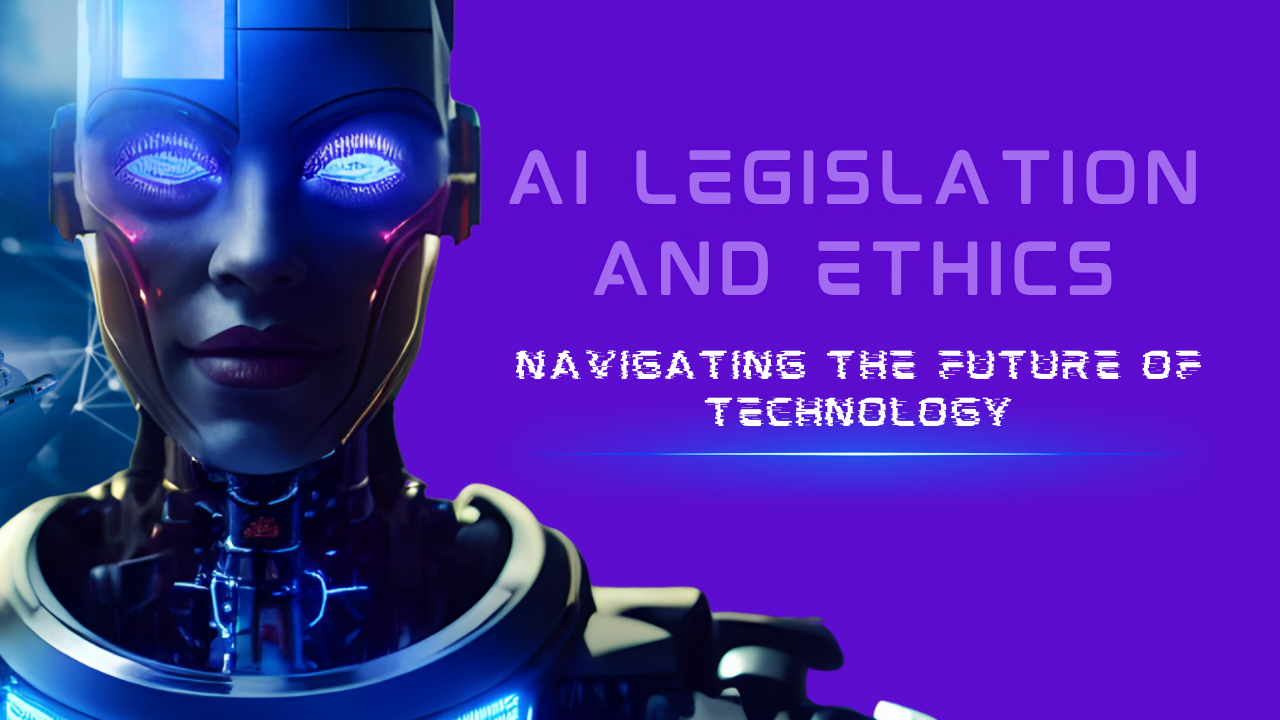- Introduction to AI Legislation and Ethics
- The Current State of AI Technology and Its Impact
- Key Ethical Concerns in AI Development and Deployment
- Global Efforts Towards AI Regulation
- The European Union's AI Act: A Case Study
- Challenges in Creating Effective AI Regulations
- Future Directions for AI Legislation and Ethics
- Conclusion: The Path Forward for Ethical AI
Introduction to AI Legislation and Ethics
As artificial intelligence (AI) technologies continue to advance and permeate various aspects of daily life, the importance of establishing comprehensive regulatory frameworks becomes increasingly evident. AI legislation and ethics play a critical role in shaping the responsible development and deployment of AI systems. These frameworks are designed not only to maximize the benefits of AI but also to address various concerns associated with its misuse, ethical implications, and impact on privacy.
The primary objective of AI legislation is to ensure that AI systems are developed and used in ways that are ethical, transparent, and accountable. This includes creating standards and guidelines that foster ethical practices, ensure data privacy, and mitigate potential harms. With AI’s capabilities rapidly evolving, lawmakers and stakeholders globally are recognizing the need for regulations that catch up with technological advancements to protect individuals and society at large.
The ethical considerations surrounding AI encompass numerous issues, including bias in AI algorithms, accountability for decisions made by AI, and the societal implications of AI in the workforce. Regulatory frameworks aim to address these issues by providing clear guidelines and standards that promote fairness, transparency, and accountability. This ensures that AI, while powerful, remains a tool that serves humanity’s best interests.
Globally, there is a significant push towards formulating and implementing comprehensive AI regulations. Various international bodies, governments, and organizations are actively working on creating cohesive strategies to govern AI. These efforts underscore a universal recognition of the necessity for robust legislation that can both harness the potential of AI and safeguard against its risks.
In summary, AI legislation and ethics are pivotal in navigating the evolving landscape of technology. By establishing strong regulatory frameworks, we can ensure that AI continues to advance in ways that are ethical, safe, and aligned with societal values.
The Current State of AI Technology and Its Impact
The rapid evolution of artificial intelligence (AI) technologies has significantly transformed various sectors, including healthcare, finance, and transportation. Machine learning algorithms, natural language processing, and computer vision are just a few examples of the advancements that have been integrated into daily operations, aiming to enhance efficiency and accuracy.
In healthcare, AI-driven diagnostic tools have demonstrated remarkable capabilities in identifying diseases at early stages with greater accuracy than traditional methods. This not only improves patient outcomes but also aids healthcare professionals in managing their workload. Similarly, in the financial sector, AI applications such as fraud detection, credit scoring, and personalized financial advising have streamlined processes, offering enhanced security and customer service.
Transportation has also seen a significant impact with the development of autonomous vehicles and intelligent traffic management systems. These innovations hold the promise of reducing accidents, improving traffic flow, and lowering emissions. AI-powered logistics and supply chain solutions are optimizing routes and inventory management, thus reducing costs and delivery times.
However, the accelerated integration of AI technologies brings forth several challenges and risks. The potential for job displacement due to automation, biases in AI algorithms, and concerns over privacy and data security are critical issues that need to be addressed. For instance, in the absence of ethical considerations, AI systems may perpetuate and even exacerbate existing societal biases, leading to unfair treatment in areas such as hiring and lending.
The transformative impact of AI underscores the importance of establishing comprehensive regulatory frameworks. These regulations are essential to safeguard ethical standards while fostering innovation. Balancing the immense potential of AI with the responsibility to mitigate its risks is crucial for sustainable and equitable technological advancement.
Key Ethical Concerns in AI Development and Deployment
The rapid advancement of Artificial Intelligence (AI) technologies presents a myriad of ethical concerns that necessitate rigorous scrutiny and regulatory attention. Among these concerns, bias in AI algorithms stands out prominently. When developers train AI systems on biased data, the resulting outputs can perpetuate and even exacerbate existing societal inequalities. For instance, facial recognition systems have been criticized for higher error rates in identifying individuals of certain racial groups, thereby demonstrating a profound impact on civil liberties and justice.
Another significant ethical issue is the lack of transparency, often referred to as the “black box” problem. Many AI algorithms, particularly those involving deep learning, operate in ways that are opaque even to their developers. This obscurity complicates accountability, making it challenging to understand how decisions are made, which is especially troubling when AI is used in critical areas such as healthcare and criminal justice.
Privacy violations also constitute a notable ethical concern in AI deployment. The collection and analysis of vast amounts of personal data are foundational to the functionality of many AI applications. However, this raises substantial privacy risks, primarily when data is collected without adequate user consent or processed in ways that individuals did not anticipate. High-profile instances of data breaches and unauthorized data sales underscore the urgency of addressing privacy implications in AI legislation.
The potential for misuse is another critical ethical consideration. AI technologies, like any powerful tool, can be repurposed for malicious ends. For example, deepfake technology can be utilized to create realistic but false videos, posing threats to political stability, personal reputations, and even national security. The dual-use nature of AI calls for stringent safeguards to prevent its exploitation for harmful purposes.
These examples emphasize the need for comprehensive and effective regulatory frameworks that address the multifaceted ethical concerns associated with AI. Addressing these issues is not just a technological challenge but a societal imperative, ensuring that the benefits of AI are realized responsibly and equitably.
Global Efforts Towards AI Regulation
As the adoption of artificial intelligence continues to grow at an unprecedented rate, governments worldwide are racing to craft legislation and frameworks to regulate its deployment. These efforts are multifaceted, addressing not only the technical aspects but also ethical considerations that arise with AI integration into daily life. A prime example of this is the European Union, which has been at the forefront of AI regulation.
The European Union has proposed the Artificial Intelligence Act, which aims to classify AI applications based on the risk they pose—ranging from minimal risk to high risk. The act is a notable effort toward ensuring that AI applications, especially those in high-stakes areas such as healthcare and transportation, meet stringent safety and ethical standards. Key provisions include requirements for transparency, human oversight, and robust governance structures.
In the United States, AI regulation is more fragmented, characterized by a patchwork of sector-specific guidelines and state-level initiatives. Efforts such as the Algorithmic Accountability Act and various state laws focus on aspects like bias detection and transparency in automated decision-making systems. Federal agencies, including the National Institute of Standards and Technology (NIST), are also contributing to these regulatory frameworks through guidelines that promote trustworthy AI development.
Asia, too, is actively engaged in formulating AI regulations. For instance, China’s New Generation Artificial Intelligence Development Plan outlines comprehensive strategies that include robust regulatory measures to ensure safety and ethical compliance. Japan has also taken steps with its Society 5.0 initiative, fostering innovation while emphasizing ethical considerations and global cooperation.
These efforts collectively represent important milestones in the global quest for balanced AI regulation. They help ensure that the technologies, which are transforming industries and societies, adhere to principles of transparency, accountability, and ethical responsibility. As trends emerge, continuous international dialogue and collaboration become crucial to harmonizing these regulatory efforts, thereby navigating the future of AI responsibly and effectively.
The European Union’s AI Act: A Case Study
The European Union’s AI Act represents a landmark in the realm of artificial intelligence governance. Envisaged as one of the most extensive regulatory measures to date, the AI Act is designed to foster innovation while ensuring ethical AI deployment. Key components of the Act include stringent compliance measures, risk assessment protocols, and transparency requirements, all aimed at safeguarding individual rights and societal well-being.
At its core, the AI Act categorizes AI systems into different tiers based on their potential risk. High-risk AI systems, which encompass critical sectors such as healthcare, infrastructure, and finance, are subject to rigorous scrutiny. Providers of these systems must adhere to strict standards related to data quality, documentation, and human oversight. By enforcing these measures, the EU aims to mitigate risks while promoting robust AI development.
Another pivotal aspect of the AI Act is its emphasis on transparency. AI providers are mandated to ensure that their systems are explainable and their decision-making processes are transparent. This requirement is pivotal in maintaining trust, especially in sensitive applications where the stakes for erroneous AI outputs are high. Additionally, the Act sets forth guidelines to prevent discriminatory practices, thus promoting fairness and equality.
The enactment of the AI Act is expected to have profound implications both within and outside the EU. For member states, it promises to level the playing field by standardizing regulatory expectations. This could potentially reduce the cost and complexity of compliance for AI providers operating across different jurisdictions. Globally, the AI Act serves as a benchmark, potentially influencing other nations to adopt similar frameworks aimed at ethical AI usage.
By setting a comprehensive regulatory standard, the European Union’s AI Act aspires to achieve a balance between innovation and ethical responsibility. The long-term impact on AI development and deployment could be significant, fostering an environment where technological advancements coexist with human-centric values. As the AI landscape evolves, the Act will likely play a critical role in shaping the direction of future technological endeavors.
Challenges in Creating Effective AI Regulations
Creating effective AI regulations presents a multifaceted array of challenges, stemming from the technical complexities, varying national interests, and the rapid pace of technological advancements. One primary obstacle is the intricate nature of AI technologies themselves. Due to their complexity, achieving a thorough understanding of AI systems is difficult, even for experts. This creates substantial barriers to formulating regulations that are not only comprehensive but also adaptable to the fast-evolving field.
Differing national interests further complicate the development of consistent, global AI regulations. Countries have diverse priorities and ethical standards, which influence their regulatory approaches. For instance, democratic nations may prioritize transparency and accountability, while others might focus on economic gains or military advancements. This divergence makes international consensus challenging, potentially leading to a fragmented regulatory landscape. Such inconsistencies can hinder the global cooperation needed to address AI’s cross-border implications effectively.
The rapid pace of technological advancement in AI exacerbates these challenges. Regulatory frameworks risk becoming obsolete almost as soon as they are implemented due to the constant innovation in AI research and applications. Policymakers must therefore strive to create flexible and adaptive regulations that can keep pace with technological progress without stifling innovation. This necessity for balance introduces a further layer of complexity in regulatory design.
Moreover, there’s a delicate balance that must be struck between promoting innovation and ensuring ethical practices. Overly stringent regulations can stifle creativity and slow down technological progress, potentially putting regions with heavy regulation at a competitive disadvantage. Conversely, insufficient regulation could lead to unethical practices, such as bias in AI decision-making or violations of privacy, which could undermine public trust in AI technologies.
Thus, regulatory bodies face the challenge of drafting rules that both foster innovation and ensure ethical standards. This requires a nuanced approach that engages stakeholders from diverse fields, such as technology, ethics, law, and public policy, to craft measures that are both effective and future-proof.
Future Directions for AI Legislation and Ethics
The landscape of artificial intelligence (AI) is advancing at a rapid pace, necessitating the evolution of legislation and ethical frameworks to effectively address new challenges and opportunities. One of the significant future directions in AI legislation and ethics is the emphasis on international cooperation. As AI technologies transcend national borders, a concerted effort towards developing harmonized regulations and standards is imperative. International bodies and cross-border agreements are likely to play a pivotal role in establishing unified guidelines that ensure the safe and ethical deployment of AI systems globally.
Another emerging trend is the focus on AI explainability. The complexity of AI algorithms often results in “black-box” systems, where the decision-making process is not easily interpretable. Future legislative measures will likely mandate AI explainability to ensure transparency and accountability. By demanding that AI developers create systems that can elucidate their functioning and decisions, stakeholders can foster greater trust and understanding among users, thereby reducing the risks associated with opaque AI applications.
Moreover, integrating ethical considerations into the AI development lifecycle from the outset is expected to become a cornerstone of future AI governance. This proactive approach entails embedding ethical principles throughout the design, development, and deployment phases of AI technologies. By doing so, developers can preemptively address potential ethical dilemmas, ensuring that AI systems align with societal values and norms. Ethical AI development may encompass aspects such as fairness, bias mitigation, privacy protection, and user consent, thereby promoting the creation of responsible and trustworthy AI innovations.
In conjunction with these trends, there is a growing movement towards the establishment of ethics review boards and continuous monitoring mechanisms. These entities would provide ongoing oversight and evaluation of AI technologies, ensuring compliance with ethical standards and regulations. This iterative process of assessment and feedback can help address emerging ethical issues dynamically, enabling a more responsive and adaptive legislative framework.
As we look to the future, it is evident that the intersection of AI legislation and ethics will become increasingly intricate. By focusing on international cooperation, AI explainability, and early integration of ethical considerations, we can navigate the evolving terrain of AI responsibly and sustainably.
Conclusion: The Path Forward for Ethical AI
Throughout our exploration of AI legislation and ethics, it has become increasingly clear that establishing robust regulatory frameworks is essential to ensuring the ethical use of artificial intelligence. These frameworks not only guard against potential misuse but also foster trust and innovation by setting clear guidelines for developers and users alike.
The significance of such legislation cannot be overstated, as it plays a pivotal role in shaping the future trajectory of AI technology. By enacting stringent policies, we can mitigate risks associated with AI, such as bias, data privacy breaches, and unintended consequences in various applications. These regulations help in holding organizations accountable, compelling them to adhere to ethical standards that prioritize human rights and societal well-being.
However, legislation alone is not sufficient. Continuous dialogue and collaboration among diverse stakeholders, including policymakers, technologists, ethicists, and the public, are imperative. Such collaborative efforts ensure that the evolving landscape of AI is navigated with a comprehensive understanding of its multifaceted implications. This engagement fosters a dynamic and responsive approach to regulation, capable of adapting to rapid advancements in technology.
Looking ahead, the long-term impacts of robust AI legislation will likely include more equitable and transparent AI systems that serve humanity’s collective interests. By committing to ethical considerations and maintaining an open forum for discussion, we can pave the way for AI innovations that enhance societal outcomes while safeguarding individual rights.
In conclusion, the path forward for ethical AI is multifaceted, requiring well-defined legislative measures complemented by ongoing stakeholder collaboration. By harmonizing regulatory efforts with ethical imperatives, we can ensure that the benefits of AI are realized equitably and responsibly, thus shaping a future where technology and ethics converge harmoniously.




